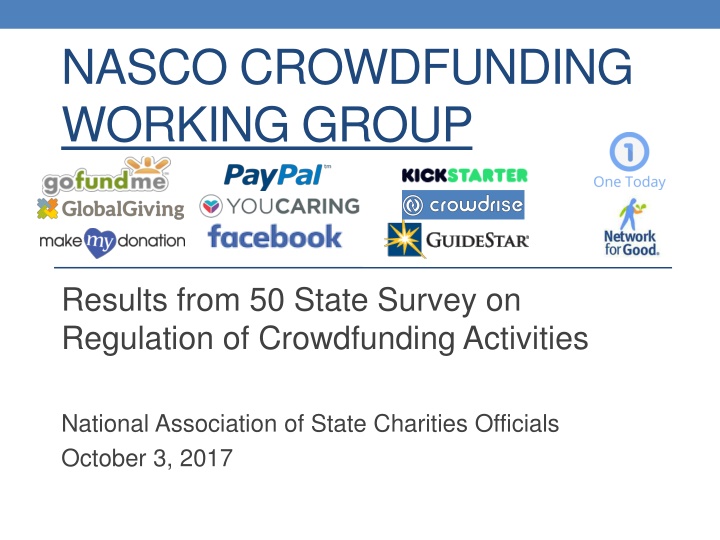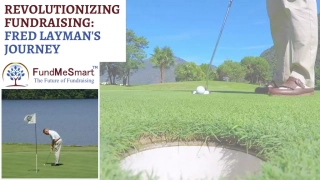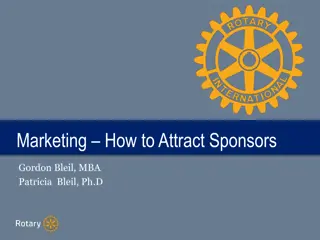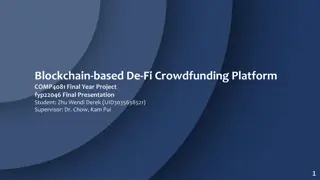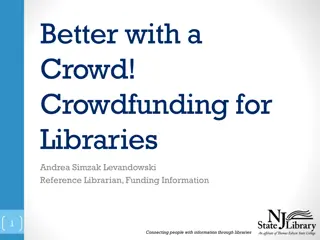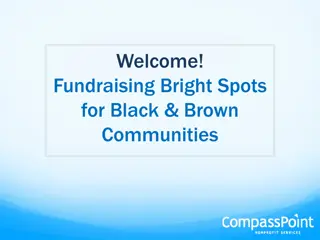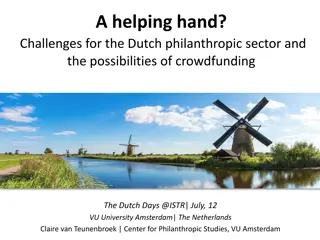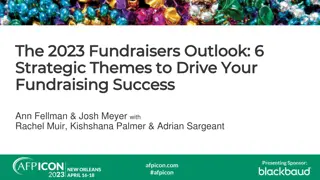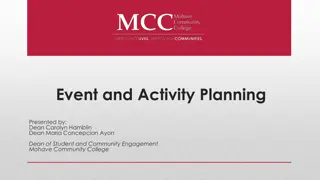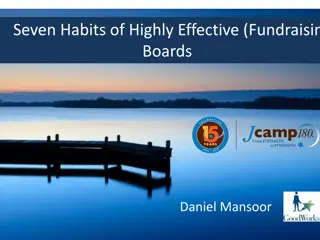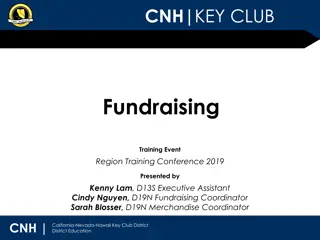Evolution of Fundraising Practices: Insights from NASCO Crowdfunding Working Group
The NASCO Crowdfunding Working Group conducted a survey across 51 states to understand how fundraising via third-party websites and social media is regulated. Results revealed differences in state approaches, with some states relying on consumer protection statutes. The survey highlighted the changing face of fundraising, with individuals leveraging online platforms for charity appeals. State regulations varied concerning fundraising by individuals for individuals, both with and without benefits for donors.
Download Presentation

Please find below an Image/Link to download the presentation.
The content on the website is provided AS IS for your information and personal use only. It may not be sold, licensed, or shared on other websites without obtaining consent from the author.If you encounter any issues during the download, it is possible that the publisher has removed the file from their server.
You are allowed to download the files provided on this website for personal or commercial use, subject to the condition that they are used lawfully. All files are the property of their respective owners.
The content on the website is provided AS IS for your information and personal use only. It may not be sold, licensed, or shared on other websites without obtaining consent from the author.
E N D
Presentation Transcript
NASCO CROWDFUNDING WORKING GROUP Image result for google one today https://encrypted-tbn0.gstatic.com/images?q=tbn:ANd9GcR70dBLcM9p_gdYIt6izvBYd_Hw0EzY92l3XugKbGoHd42sxYFWxR5QFg Image result for youcaring logo https://encrypted-tbn0.gstatic.com/images?q=tbn:ANd9GcRO8IVEM8H_YyAfAobjqAIDL_SC_-4CHUUssxJpu5y21cAHOcSIPthaLc0 Results from 50 State Survey on Regulation of Crowdfunding Activities National Association of State Charities Officials October 3, 2017
The face of fundraising is changing Individuals who fundraise on websites make appeals once reserved to charities democratization of fundraising Websites serve as gateways for donations to any and all charities Individuals use social media for peer to peer fundraising to benefit charities Disaster fundraising has moved to the internet
What we did Crowdfunding working group formed at the 2016 NASCO conference Group decided early on to learn how states handle issues relating to fundraising via third party websites and social media Group designed and distributed an online survey for each state to complete Survey focused on charity regulation, not consumer protection or common law rules
Results Of 51 states (including DC), 41 responded While survey included screen shots for illustration, some confusion with subtle distinctions among questions While survey intended to exclude general consumer protection regulation, some states rely upon those statutes for regulation of fundraising
Fundraising for individuals no benefit Does your state regulate fundraising by individuals for individuals where there is no opportunity for a benefit? Yes 14 No 27
Fundraising for individuals - benefit Does your state regulate fundraising by individuals for individuals where there is an opportunity for a non-equity benefit? Yes 5 No 36
Fundraising for individuals Does your state regulate third party websites (GoFundMe, etc.) for their activity hosting fundraising campaigns for individuals where there is no offer of a benefit? Yes 7 No 34 Does your state regulate third party websites (Kickstarter, etc.) for their activity hosting fundraising campaigns for individuals offering a non-equity benefit? Yes 5 No 36
Fundraising for charities Does your state regulate third party websites for their activity hosting fundraising campaigns submitted by charities? Yes 19 Only if website charges a fee 8 No 22 If yes, how would you regulate them? Paid fundraiser 10 Fundraising counsel 4 Commercial co-venture 4
Fundraising for charities Does your state regulate third party websites for their activity allowing donors to contribute to most any charity (charity list imported from from GuideStar or IRS Master File)? Yes 19 Only if website charges a fee 5 No 22 If yes, how would you regulate them? Uncertain: paid fundraiser, fundraising counsel, commercial co-venture Examples of entities regulated: Amazon Smile, PayPal Giving Fund, GoFundMe Impact Fund, Network for Good
Fundraising for charities Does your state require that any charity give its permission before a third party website may offer donors the chance to donate to that charity? Yes 26 Only if website also displays charity s logo or its written material 1 No 15
Peer to peer fundraising campaigns Does your state regulate individuals who conduct peer to peer campaigns to contribute to a charity using a third party website? Yes 10 No 31 Does your state require individuals who conduct those peer to peer campaigns to obtain permission from the charity? Yes 10 Only if individual also displays charity s logo or its written material 1 No 31
Peer to peer fundraising campaigns Does your state regulate third party websites that host individual peer to peer campaigns to benefit a charity? Yes 8 Only if they are compensated or touch the money 1 Only if they are compensated 7 No 33 Does your state require third party websites that host individual peer to peer campaigns to obtain permission from the charity? Yes 11 No 20
Donor advised fund used as intermediary Network for Good, PayPal Giving Fund, American Online Giving Foundation, MakeMyDonation, etc.
Donor advised funds Does your state regulate donor advised fund charities that receive and distribute donations collected for specific charities through a third party website? Yes 25 As a professional fundraiser, if paid As a charity 14 No 16 9 Examples: Network for Good, AmazonSmiles, PayPal Giving, American Online Giving, GoFundMe Impact, MakeMyDonation, Fidelity, U.S. Charitable Gift Trust, Schwab
Disaster fundraising Has your state experienced a disaster or violent event that led to large scale crowdfunding activity? Yes 22 No 19 Responses by states to disaster fundraising: Coordination to create a central donation recipient (One Boston, Aurora Victim Relief Fund, OneOrlando) Outreach to public on wise giving Outreach to crowdfunding websites Follow up on complaints Facilitate closeout of funds and transfers between funds Issuance of report on disaster fundraising (Sandy Hook) New statute requiring financial reports for disaster fundraising (Tennessee)
Jurisdictional issues How does your state address jurisdictional requirements to permit regulation of third party websites through which a donor may make a charitable contribution? Charleston principles 5 Look whether it targets state residents as donors Look whether it fundraises for a charity operating in the state 1 Not encountered yet 8 9
Crowdfunding enforcement activity Has your state engaged in any enforcement activity arising out of crowdfunding? Yes 17 Administrative investigations 15 (includes Charity Blossom [now defunct], PayPal [ongoing], others) Fundraising for a charity without its permission 3 Registration as professional fundraiser required 4 Criminal referral for fraud 4 No 24
Crowdfunding benefits and problems Benefits: charities can raise money quickly, raise awareness of causes, lower fees than with other fundraising methods, good use of social media, individuals can raise money from social network, solicitation is publicly available for all to monitor Problems: public confusion between charity and individual giving, regulatory scheme unclear, no permission given by charity to appear on website, unclear jurisdiction, charitable fundraising laws not written with crowdfunding in mind, possible increased fraud
Crowdfunding and traditional charities Any effect in your state on traditional charities resulting from fundraising for individuals using third party websites? No measurable effect 3 Unknown 25
Evaluation of crowdfunding regulation Is current professional fundraising law adequate? Yes 5 No 12 Should self-regulation be encouraged? Yes 5 No 4 Is there a need for a new uniform law? Yes 17 No 8 Is there a need for a single registration for 50 states? Yes 10 No 9
